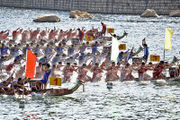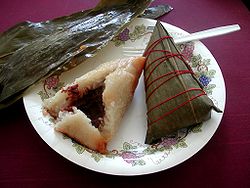Duanwu Festival
| Duanwu Festival | |||||||||||||||||||
|---|---|---|---|---|---|---|---|---|---|---|---|---|---|---|---|---|---|---|---|
 |
|||||||||||||||||||
| Dragon Boat Festival racing in Macau | |||||||||||||||||||
| Traditional Chinese | 端午節 | ||||||||||||||||||
| Simplified Chinese | 端午节 | ||||||||||||||||||
|
|||||||||||||||||||
| Alternative Chinese name | |||||||||||||||||||
| Traditional Chinese | 端陽 | ||||||||||||||||||
| Simplified Chinese | 端阳 | ||||||||||||||||||
|
|||||||||||||||||||

Duanwu Festival (Chinese: 端午節/端午节), also known as Dragon Boat Festival, is a traditional and statutory holiday associated with Chinese and other East Asian and Southeast Asian societies as well. It is a public holiday in mainland China (since 2008[1][2]), where it is known by the Mandarin name Duānwǔ Jié, and in Taiwan, as well as in Hong Kong and Macau, where it is known by the Cantonese name Tuen Ng Jit. The festival is also celebrated in countries with significant Chinese populations, such as in Singapore and Malaysia. Equivalent and related festivals outside Chinese-speaking societies include the Kodomo no hi in Japan, Dano in Korea, and Tết Đoan Ngọ in Vietnam.
The festival occurs on the fifth day of the fifth month of the lunar calendar on which the Chinese calendar is based. This is the source of the alternative name of Double Fifth.[3] In 2009 this falls on May 28 and in 2010 on June 16. The focus of the celebrations includes eating the rice dumpling zongzi, drinking realgar wine xionghuangjiu, and racing dragon boats.
Contents |
Etymology

Duanwu Festival is traditionally celebrated on the fifth day of the fifth month on the Chinese lunar calendar.
Duanwu commemorates the life and death of the famous Chinese scholar Qu Yuan. He was a loyal minister serving the King of Chu during the Warring States Period in the third century BCE. Initially his sovereign favored Qu Yuan, but over time, his wisdom and erudite ways antagonized other court officials. As a result Qu Yuan was accused of trumped-up charges of conspiracy and ejected by his sovereign. During his exile, Qu Yuan composed many poems to express his anger and sorrow towards his sovereign and people.
In the year 278 BCE, at the age of 37, Qu Yuan drowned himself in the Milo River. He clasped a heavy stone to his chest and leaped into the water. Knowing that Qu Yuan was a righteous man, the people of Chu rushed to the river to try to save him. The people desperately searched the waters in their boats looking for Qu Yuan but were unsuccessful in their attempt to rescue him. Every year the Dragon Boat Festival is celebrated to commemorate this attempt at rescuing Qu Yuan.
When it was known that Qu Yuan had been lost forever, the local people began the tradition of throwing sacrificial cooked rice into the river for their lost hero. However, a local fisherman had a dream that Qu Yuan did not get any of the cooked rice that was thrown into the river in his honour. Instead the fish in the river were eating the rice. Thus, the locals decided to make zongzi to sink into the river in the hopes that it would reach Qu Yuan's body. The following year, the tradition of wrapping the rice in bamboo leaves to make zongzi began.
A second version of the story holds that when it was known that Qu Yuan had been lost to the river, local fisherman dreamt that the fish in the river were eating Qu Yuan's body. The local people developed the idea that if the fish in the river were not hungry, then they would not eat Qu Yuan's body. People thus began throwing zongzi into the river to feed the fish in hope that Qu Yuan's body would be spared.
Yet another version of the story states that Qu Yuan ate the zongzi and rose to the heavens due to the white rice being so light and that the more he ate the faster he rose, ultimately joining with the great god Buddha in the clouds (known as the yonguan song, or Floating Rice Man).
Date
Like all other traditional Chinese festivals, Duanwu is reckoned in accordance with the lunar calendar consisting of 29 or 30 days. For this reason Duanwu - the fifth day of the fifth moon, or double fifth - drifts from year to year on the Gregorian (solar) calendar.
The moon is considered to be at its strongest around the time of summer solstice ("mid-summer" in traditional Japan, but "beginning" of summer elsewhere) when the daylight in the northern hemisphere is the longest. The sun (yang), like the dragon (long), traditionally represents masculine energy, whereas the moon (yue), like the phoenix (or firebird, fenghuang), traditionally represents feminine energy. Summer solstice is considered the peak annual moment of male energy while the winter solstice, the longest night of the year, represents the peak annual moment of feminine energy. The masculine image of the dragon is thus naturally associated with Duanwu.
History
Origins
The Duanwu Festival is believed to have originated in ancient China. A number of theories exist about its origins as a number of folk traditions and explanatory myths are connected to its observance. Today the best known of these relates to the suicide in 278 BCE of Qu Yuan, poet and statesman of the Chu kingdom during the Warring States period.
Qu Yuan
The best-known traditional story holds that the festival commemorates the death of poet Qu Yuan (c. 340 BCE – 278 BCE) of the ancient state of Chu, in the Warring States Period of the Zhou Dynasty.[4] A descendant of the Chu royal house, Qu served in high offices. However, when the king decided to ally with the increasingly powerful state of Qin, Qu was banished for opposing the alliance. Qu Yuan was accused of treason.[4] During his exile, Qu Yuan wrote a great deal of poetry, for which he is now remembered. Twenty-eight years later, Qin conquered the capital of Chu. In despair, Qu Yuan committed suicide by drowning himself in the Miluo River on the fifth day of the fifth lunar month.
It is said that the local people, who admired him, threw food into the river to feed the fish so that they would not eat Qu Yuan's body.[4] This is said to be the origin of zongzi. The local people were also said to have paddled out on boats, either to scare the fish away or to retrieve his body. This is said to be the origin of dragon boat racing.
Wu Zixu
Despite the modern popularity of the Qu Yuan origin theory, in the former territory of the state of Wu the festival commemorated Wu Zixu (526 BCE* – 484 BCE). Wu Zixu was a loyal advisor whose advice was ignored by the king to the detriment of the kingdom. Wu Zixu was forced to commit suicide by the king Fuchai, with his body thrown into the river on the fifth day of the fifth month. After his death, in places such as Suzhou, Wu Zixu is remembered during the Duanwu Festival to this day.
- It seems that, here, Wu Zixu's birth year is false because Wu Zixu designed and built the city of Suzhou in 514 BCE. Thus, if he were born in 526 BCE, he must be just 12 years old at the time of the construction of Suzhou, which is totally impossible. Actually, the birth year of Wu Zixu is unknown.
Pre-existing holiday
Some modern researchers suggest that the stories of Qu Yuan or Wu Zixu were superimposed on a pre-existing holiday tradition. The promotion of these stories over the earlier lore of the holiday seems to have been encouraged by Confucian scholars seeking to legitimize and strengthen their influence at a time when Buddhism, a foreign belief system, was gaining influence in China. The Records of the Grand Historian of that era relate to this.
Many traditional rituals of the Duanwu Festival emphasize the avoidance of disease. The desire to prevent health hazards associated with the mid-summer months may have been the primary original motive behind the holiday.
Another theory, advanced by Wen Yiduo, is that the Duanwu Festival had its origins in dragon worship. Support is drawn from two key traditions of the festival: the tradition of zongzi, or throwing food into the river, and dragon boat racing. The food may have originally represented an offering to the dragon king, while dragon boat racing naturally reflects reverence of the dragon and the active yang energy associated with it. This combines with the tradition of visiting friends and family on boats.
Another suggestion is that the festival celebrates a widespread feature of east Asian agrarian societies: the harvest of winter wheat. Offerings were regularly made to deities and spirits at such times: in the ancient Yue, dragon kings; in the ancient Chu, Qu Yuan; in the ancient Wu, Wu Zixu (as a river god); in ancient Korea, mountain gods (see Dano (Korean festival)). As interactions between different regions increased, these similar festivals eventually merged into one holiday.
Public holiday
The festival was long marked as a holiday culturally in China. However, the People's Republic of China government, established in 1949, denied official recognition to traditional holidays such as Duanwu. Beginning in 2005 the government began to plan for the re-adoption of three traditional holidays, including Duanwu.[5] In 2008 Duanwu was celebrated as a public holiday in the People's Republic of China for the first time.[6]
Activities
Three of the most widespread activities for Duanwu Festival are eating (and preparing) zongzi, drinking realgar wine, and racing dragon boats.[7]
Other common activities include hanging up icons of Zhong Kui (a mythic guardian figure), hanging mugwort and calamus, taking long walks, and wearing perfumed medicine bags. Other traditional activities include a game of making an egg stand at noon, and writing spells. All of these activities, together with the drinking of realgar wine, were regarded by the ancients as effective in preventing disease or evil and promoting health and well-being.
In the Republic of China , Duanwu was also celebrated as "Poets' Day," due to Qu Yuan's status as China's first poet of well renown. In modern Taiwan, zongzi are no longer thrown into rivers, but people still eat them as a holiday tradition and testament to Qu Yuan's self-determination.
Culture
The Taiwanese version of the holiday is commemorated in a solo piano work, "Dragon Boat Festival" (龍舟競渡, 1996) by composer Tyzen Hsiao.
References
- ↑ Decree of the State Council of the People's Republic of China (No.513) 2008. (Index entry, State Council Gazette Issue 2 Serial No. 1253)
- ↑ Chinese mark first "official" Qingming
- ↑ Double Fifth (Dragon Boat) Festival for the name "Double Fifth"
- ↑ 4.0 4.1 4.2 SCMP. "SCMP." Earthquake and floods make for muted festival. Retrieved on 2008-06-09.
- ↑ People's Daily. "Peopledaily." China to revive traditional festivals to boost traditional culture. Retrieved on 2008-06-09.
- ↑ Xinhua Net. "First day-off for China's Dragon Boat Festival helps revive tradition." Xinhua News Agency. Published 2008-06-08. Retrieved on 2008-06-09.
- ↑ "Dragon Boating Not Just for Asians". AsianWeek. Published 2008-10-02. Retrieved on 2008-10-03.
External links
- See original pictures of Qu Yuan's hometown (now submerged by waters of three gorges dam project) and his country capital
- Dragon Boat Net, about the dragon boat sport and its tradition
- More pictures on Hong Kong official tourism website about Dragon Boat Festival
- More pictures of Dragon Boat Festival
- Dragon Boat World Int. - the worlds dragon boat magazine
- History, Tradition and Legends of Dragon Boat Festival
|
||||||||||||||||||||||||||||||||||||||||||||||||||||||||
|
||||||||||